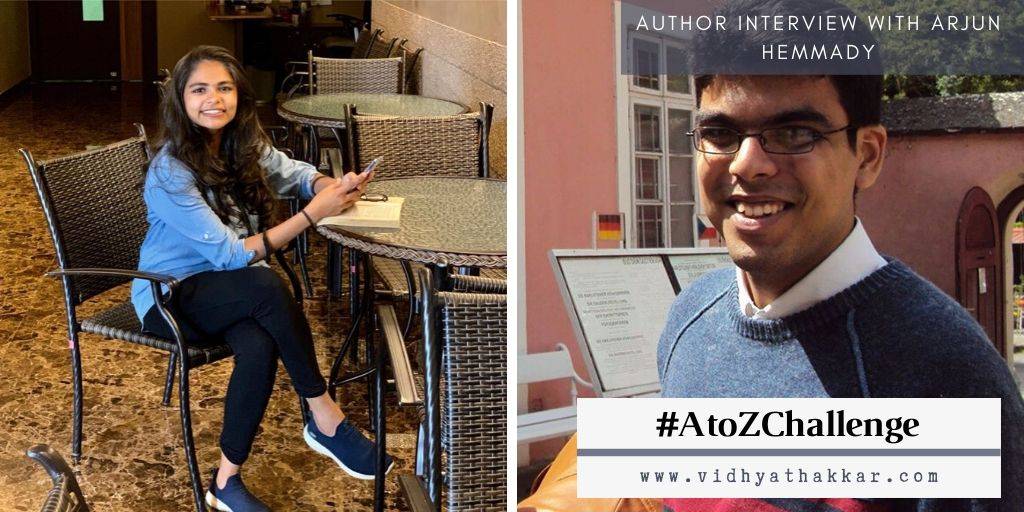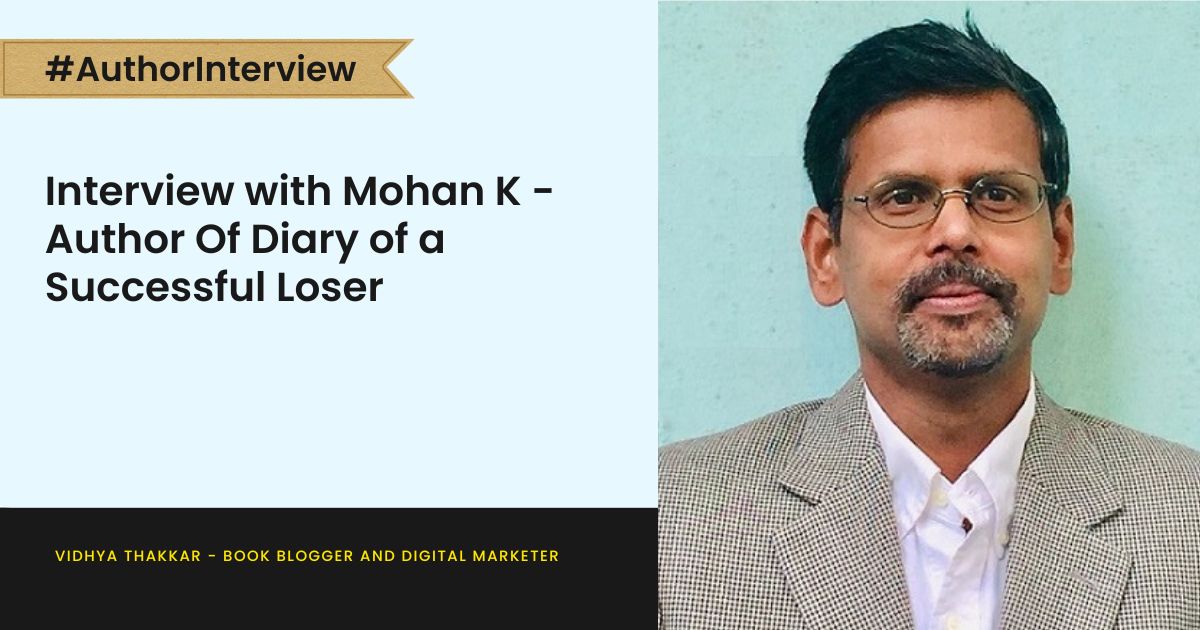About the Author
A full-time Finance Professional, Arjun Hemmady has been interested in writing since an early age. He has written various articles on topics such as driving and sports and the current socio-political scenario in India. The next step in his literary journey was definitely then to write a novel. He published his first novel at the age of 26, titled “You Raise Me Up” in November 2015. When not working, Arjun likes to cook, read, drive and watch movies and sports.
Check the review here: Book Review of Captain Khadoos by Arjun Hemmady – #BlogChatterA2z Challenge
Interview:
1: Why this genre? If you have to write in some other genre what that would be?
– Hi Vidhya! Thanks for interviewing me and giving me the opportunity of reaching out to your readers. I have always loved the sports drama genre and I particularly love watching cricket. Sports dramas show characters testing and pushing their limits both physically and mentally, which is something that fascinates me. In the novel I have shown the journey of a fictional character, Suraj Bhatkal who is India’s Cricket Captain. Suraj is someone who has suffered from depression and has taken time away from the game to deal with the illness. There have been many cricketers who have come out in the open with their struggle with this dreadful disease like Marcus Trescothick, Jonathan Trott, Andrew Flintoff and more recently Glenn Maxwell. I thought that it would be interesting to mix these two themes in a novel.
My first novel called You Raise Me Up, which was released in 2015, is a romantic comedy-drama. However, if I were to write another genre, it would definitely be a mixture of political-military-alternate history action thriller.
2: Tell us about the idea behind the book?
I got the idea while playing the computer game called EA Cricket 07. In this game, I would select the Indian Cricket Team and play matches. However, I noticed that there wasn’t a genuine all-rounder in the Indian Team because of which the balance of the Team would go for a toss. So I thought that I should create a player and fit him in the Indian Team. So then the idea of Suraj Bhatkal was born. I made him a left handed defensive batsman and a right handed frontline fast bowler and also the Captain of the Team.
3: Your favorite part from the book?
I have a few favourite parts. One of them is definitely the Author’s Note wherein I have written about depression, the stigma associated with it especially in our society and how sufferers can deal with it. It is very common for sufferers of depression to be humiliated especially verbally and made to think that there is something wrong with them. This approach is very wrong. The sufferer requires extra attention and care, but not sympathy. They are already in a bad space mentally and verbally insulting them further by calling them weak, ungrateful or negative just causes more damage. We must remember that they are in a very vulnerable position and bad advice in some cases can make them take the ultimate and tragic decision of taking their own lives.
Another part of the book which I like is the interview given by the main character Suraj Bhatkal wherein he states that “I have suffered from depression and am not ashamed of it.” Shame and guilt is very common among people who have suffered from depression. I wanted to show a scenario wherein Suraj, who is the Captain of the Indian Cricket Team comes out and spills the beans about his struggle with this disease. In this, I wanted to show that there is nothing wrong in suffering from the disease.
One part which I think readers may find inspirational is wherein Suraj decides to go onto the field despite getting seriously injured. Herein, I have tried to depict that people who have suffered from depression in their past, are capable of incredible feats of mental and physical strength. Lots of people believe that people suffer from depression because they are mentally weak, which is not true. Anyone can suffer from depression. It does not discriminate between rich and poor, successful and wealthy etc.
4: How much time it took in the process of writing?
I got the idea for Captain Khadoos in 2011-12. I actually started writing in earnest in around 2016. I finished writing the book in 2018 and in February 2018 Neil D’Silva (who I knew since the launch of my first novel) introduced me to Suhail Mathur of The Book Bakers, a Literary Agency. I pitched my idea to Suhail and he said that found the idea interesting and said that he would like to become my Literary Agent. I started working with Suhail around that time and within a few months, I got a Contract from TreeShade Books.
5: What did the process of writing this book taught you?
When I wrote my first novel, I was a novice. I didn’t think that editing was very important, and I could have edited the book better. I realised this when reviews for the novel came in and the reviewers commented that the editing could have been better. So this time around I was determined to not repeat the same mistake. I felt I had a responsibility to give my best not only for myself, but also for Suhail, who had worked so hard for getting me the Contract. Even now, I have to admit that I don’t enjoy editing. I find it tiresome and boring at times, but I put aside those negative feelings and dug deep. A large part of the credit also goes to the Editor of Captain Khadoos, Harini Srivinivasan, who is an author herself. Her incredible valuable guidance and tips made Captain Khadoos a much better book.
6: What inspired you to write this book ?
As I have stated before, I am passionate about mental health awareness and also cricket. So it was an obvious choice for me to write a sports drama with a background of mental health, something I believe had not been done till that time.
7: 5 books one must read in lifetime.
Suketu Mehta’s Maximum City, Amish’s Shiva Trilogy, Shashi Tharoor’s Inglorious Empire, Rahul Dravid’s Biography and S. Hussain Zaidi’s Dongri To Dubai.
8: A book that had an impact on you, which helped you in writing this one?
In terms of research material, it was a mix of written material and videos. I had read Rahul Dravid’s Biography which helped me to understand the great man’s mindset while playing his characteristic long innings. But more than that, I had researched about cricketers like Shivnarine Chanderpaul, Ravi Shastri, Zaheer Khan, Imran Khan, Trevor Bailey and James Anderson among others. To elaborate, Shivnarine Chanderpaul and Ravi Shastri for their batting style. Zaheer Khan and James Anderson because they have continually sharpened their skills as their careers progressed. Imran Khan and Trevor Bailey for their all round skill and leadership ability on the field.
9: Tell us about your publishing journey in 5 words.
Exciting, enriching, enjoyable, satisfying and challenging.
10: A quote, para from the book that inspires you?
A line in the Author’s Note which I had written – “Depression is a disease that is managed and not fought. If one goes into the situation with the intention of fighting, then the whole process becomes toxic. Instead, one must be tactful and self-aware. We are all unique and must not compare ourselves with others. If we want to compare ourselves at all with anyone, we must compare ourselves with past versions of ourselves”
11: Tell us about your future plans? Planning a new book?
I am currently focused on my job. I have a full time job in the Finance Department of a Media Company and that keeps me occupied for a large part of the day. I do have an idea for a new book. Without revealing too much, it can be either another Sports Drama or a Alternative History/Speculative Fiction Military cum Political Drama.
12: What is literary success for you?
Every author dreams of his/her work being projected on the silver screen. I also harbour that dream that one day Captain Khadoos may be made into a big budget movie. But more realistically, I like to practice CTC (Control The Controllable) and so literary success is constantly evolving and improving as a writer. I am still learning and hope that I never stop doing so.
13: A message for budding writers.
I didn’t know any writer personally when I had begun my journey of writing a novel. So I will give a few tips/pointers which I hope I had received then –
1) Never be afraid of reading your own work – Sometimes authors (like myself) may feel embarrassed to read what they have written. Always read what you have written and be prepared to be disappointed in it at times. Not everything we write will turn out amazing. A lot of it will end up being edited out, but don’t be discouraged. That does not mean that you are a bad writer. Have faith in your ability.
2) In my opinion, actual writing is a very small part of the entire process. A major part of it is reading, re-writing several times and editing. I have lost count of the number of times that I have gone through and edited Captain Khadoos, it must definitely be above 50 times. Be willing to put in the hard yards. There will be times when you may think that it is not worth it, but please persevere. Every writer goes through phases of self doubt. Self doubt is unavoidable. Embrace it, learn from it and don’t fight it.
3) Know the strengths and weakness of your novel – Criticism from various people is inevitable. Even stalwarts like Dan Brown have been criticised for certain facets of their writing. To elaborate, I knew that certain people may not like the storyline of my novel for various reasons. A storyline is subjective – not everyone is going to be convinced that it’s a good idea. So when people gave me criticism about the storyline, I just shrugged and said that it’s not in my control. However, as I have said before, what was in my control was the editing. So I ensured that not a single error makes its way into the final print. So when certain people have criticised the editing of the book, I personally don’t pay any attention to it, because I know that it is the strength of my novel. Please don’t get me wrong, I don’t mind criticism. But to be honest, I have noticed various types of criticism. One is genuine criticism – which is hard to find. The second is criticism for the sake of it – this is more common that you think. Some people seem to believe that criticising something makes them look intelligent and unique.
So, learn to distinguish between genuine criticism and people who just give “gyaan”. It will help you a lot not only in your literary journey, but also in life.
Wish you all the best!


